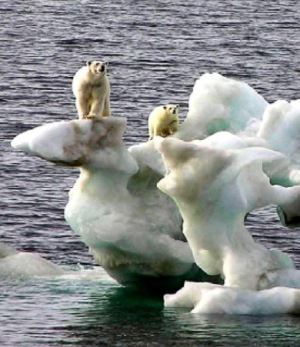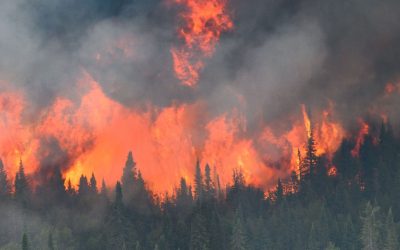 Polar Bear Propaganda
Polar Bear Propaganda
If a picture is worth a thousand words, then it can also be used to tell a bigger lie. In this case, of the 29 words used to describe the scene depicted in the photograph, eight of them are emotional: “very sad”, “hapless”, “clinging”, “whatever is left” and “home”. This should alert readers to the fact that they are being manipulated with baseless propaganda.
Polar bears commonly seek high points for a better view. In this image, they were simply observing a cruise ship carrying the tourist who took the image. The phrase “whatever is left of their home” is inaccurate, anthropomorphic and deliberately emotional. Polar bears don’t have ”homes”. Females build dens on land to give birth, but that’s all. While some bears spend all their time on the ice, most come ashore when the ice melts.
Anthropmorphism is disturbing, especially when used by scientists. A good example is the absurd comment by Manitoba Provincial biologist Darryl Hedman about the den used by a female polar bear. “Unreal,” said Hedman as he squeezed into the den. “Imagine spending a winter in a space like this where you can barely move and not have any food to eat or water to drink.” (Ref.)
This is all part of the emotional propaganda used by activists in this age of environmental hysteria. More often than not, it is based on inaccurate science, or information taken totally out of context.
Yet governments regurgitate unsubstantiated claims by climate activists and their allies in academia and mass media that polar bears are doomed because of global warming. Consider the July 17, 2012 article “Bleak future for polars bears, U of A scientists say” in the Calgary Herald, Montreal Gazette, Edmonton Journal and other newspapers. Reporter Ed Struzik asserts, “Most of the world’s polar bears are likely to disappear in the next 30 to 50 years if the Arctic continues to heat up as climatologists predict, two University of Alberta scientists say.” This sort of speculative alarmism appears regularly in press without acknowledgement of real climate and polar bear history. The world has cooled since 1998, the IPCC predictions are already incorrect, and polar bears have survived thousands of years of warmer conditions including the recent past.
Environmentalists, media and government exploit the public’s lack of basic science literacy by finding scientists to quote to lend credbility to the side of the story they want accepted. The scientists cited rarely see how their quotes are to be used and so do not have a chance to correct and clarify before the story is published. In this case, the experts quoted acknowledged the basis of their “prediction” is the official science of the Intergovernmental Panel on Climate Change (IPCC) and used the standard conditional phrasing that escapes public attention because they only remember the headline. “Bleak future for polar bears” is not what the U of A scientists warned of. They speculated that it is a “likely” outcome, “if” the IPCC predictions are correct.
View entire study as PDF (23 Pages)


